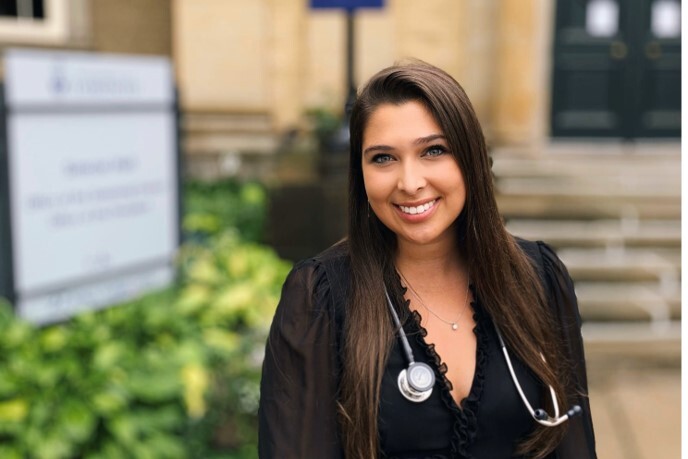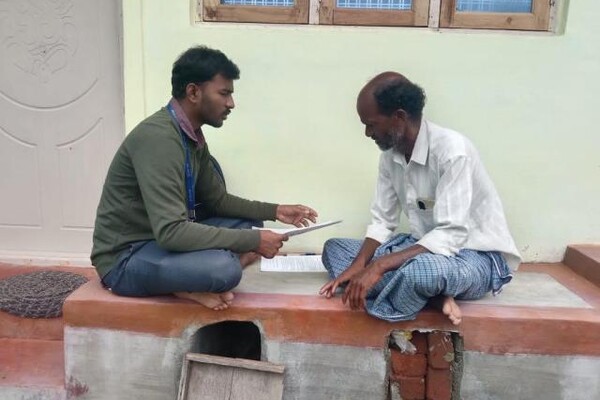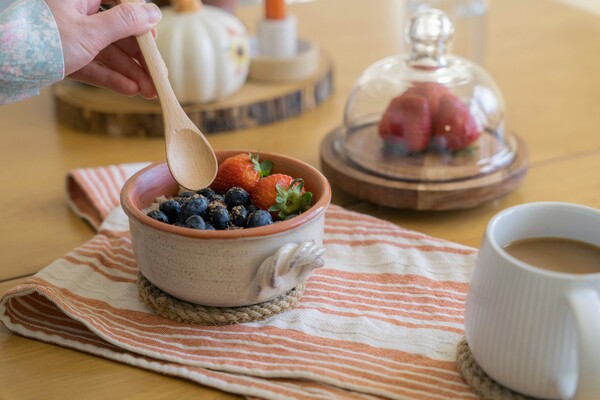Mobile Menu
- Education
- Research
-
Students
- High School Outreach
- Undergraduate & Beyond: Community of Support
- Current Students
- Faculty & Staff
- Alumni
- News & Events
- Giving
- About

The COVID-19 pandemic was an especially harrowing time for pregnant people and new parents. The uncertainties about how the new coronavirus could affect a pregnant person and their developing fetus and being suddenly cut off from their support networks left many expecting parents feeling isolated and anxious.
“It was a very surreal time,” says Jenny Doyle, a Toronto mom who gave birth to her first child Elliott in November 2020.
When she became eligible for the COVID-19 vaccine in May 2021, Doyle was proactive in researching the new vaccines and how they might affect both her and her baby. She felt reassured by how safe the vaccine appeared to be in the clinical trials and early roll-out, and by the possibility that its protective effects could be passed on to her baby through breastmilk.
“At the time, vaccines for infants were still so far away. I remember hoping that some of the protection I’d received from my vaccine would pass through to Elliott.”
Now, new findings from a University of Toronto study are providing evidence to support the hopeful idea that Doyle — and countless other new parents — clung to as they waited for vaccines to be made available for their babies.
Led by members of U of T’s Temerty Faculty of Medicine including Deborah O’Connor, who is the Earle W. McHenry Professor and chair of the department of nutritional sciences, Sharon Unger, medical director of the Roger Hixon Ontario Human Milk Bank, and Susan Poutanen, microbiologist and infectious disease consultant at Sinai Health, the study looked for antibodies against SARS-CoV-2 in breastmilk from three different cohorts: individuals who contracted COVID-19 while pregnant or nursing, routine milk bank donors and individuals who received two doses of the COVID-19 vaccine while pregnant or nursing.
The researchers detected antibodies in breastmilk from roughly half of the people in the COVID-19 positive cohort but less than 5 per cent of routine milk bank donors, who did not have any known exposures to COVID-19. In the vaccinated cohort, they found that antibodies levels were higher in people who had received the Moderna vaccine compared to those who had received the Pfizer-BioNTech vaccine. Unexpectedly, people who had shorter intervals between their first and second doses had higher antibody levels than those who waited longer between their immunizations.
“That finding definitely surprised me,” says Samantha Ismail, the study’s first author who completed her master’s degree in O’Connor’s lab. “In [blood] serum, it’s the other way around where longer intervals between doses typically result in higher antibody levels, suggesting that something different is happening in this lactating population.”
Ismail and her colleagues took their study one step further by showing that some breastmilk samples could prevent SARS-CoV-2 from infecting cells in a lab setting. Within the COVID-19 positive cohort, milk that contained antibodies against the virus were more likely to be neutralizing, and immunization with the Moderna vaccine was associated with a stronger neutralizing capacity than the Pfizer-BioNTech vaccine.
The researchers also found a small but significant number of breastmilk samples that prevented SARS-CoV-2 infection despite having undetectable levels of antibodies, suggesting that there could be other components in human milk that are active against SARS-CoV-2.
While these findings provide strong evidence to support the potential protective effects of human milk, Ismail cautions that their study alone is not enough to prove that breastmilk provides tangible protection against COVID-19.
“COVID-19 vaccination and infection result in antibodies in human milk that have neutralizing capacity, but we don’t know for sure how the neutralizing capacity seen in the lab translates to protection in infants,” says Ismail, who is now a second-year medical student at U of T.
She points out that previous studies have shown a clear protective effect of antibodies in human milk against other viruses like enterovirus and rotavirus. To date, such studies have not been done with COVID-19.
Even so, these findings are welcome and reassuring news to parents like Doyle, who breastfed her son longer than she had intended to ensure that he was still getting breastmilk when she received her second COVID-19 vaccine.
“Trying to figure out how to protect this tiny being in that scary and bleak time, I was grasping at every little piece of information and whatever little piece of hope we had.”
This work was a collaboration between the department of microbiology at Sinai Health System/University Health Network, the Roger Hixon Ontario Human Milk Bank at Sinai Health System and the Toronto High Containment Facility, where the live SARS-CoV-2 neutralization studies were done. It includes contributions from several members of the Emerging and Pandemic Infections Consortium including O’Connor, Poutanen, Unger, Scott Gray-Owen, Jennie Johnstone, Allison McGeer and Samira Mubareka.

